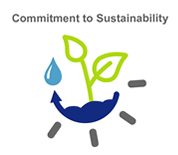 At Wheaton, a commitment to sustainability permeates everything we do—shaping our curricula, clean energy practices and way of life.
At Wheaton, a commitment to sustainability permeates everything we do—shaping our curricula, clean energy practices and way of life.
Here’s a sampling of Wheaton’s green culture in action
-
Electric Vehicle Charger stations were made available for use by our community in 2021. The banks of chargers (10 each) are located in Lot 2 (closest to the East Main Street entrance) and in Lot 1 (in front of Clark Recreation hall) and are reserved for use only by faculty, staff, and students who have a Wheaton parking permit and are actively charging their e-vehicle.
-
Students in the ECCO (Environmentally Conscious Community Oriented) House run a campus-wide composting program and host conversations about environmental conservation.
-
Over 18 months, Wheaton retrofitted more than 4,000 fixtures with high efficiency LED lighting—an action that not only conserved energy, but produced an estimated $100,000 in annual savings.
-
At Wheaton’s student-run community garden, WheaFarm, students get their hands dirty, growing all types of fruits, vegetables and herbs—while operating under a larger mission of promoting food justice and sustainability. (Read about the annual springtime event, Farm Fest.)
-
Construction is complete on a 1.3MW solar field on Wheaton’s Clapp Street parcel. Construction is underway on another 350KW in rooftop solar on the former Science Center (currently the Diana Davis Spencer Discovery Center) and Haas Athletic Center. Wheaton’s solar field is one of three projects that provide electricity sufficient for 450 homes and are equivalent to planting 60,000 trees, preserving 2200 acres of forest, and taking 500 cars off the road.
-
In 2016, two dozen filtered water bubblers were deployed across campus with support from SGA—thanks to students from Professor Richardson’s “Business and Management Responsibility” course. They evaluated a range of possible campus sustainability initiatives as part of their coursework.
-
Wheaton Dining Services proactively seeks to minimize its environmental impact. Emerson Dining Hall’s eco café sources organic food from local sources, and Chase Dining Hall received its official LEED Silver certification in 2016.
-
Former EPA Administrator and New Jersey Governor Christine Todd Whitman ’68 visited campus in April 2016 to talk with students about the intersection of politics and the environment. (Read more about her visit.)
-
In spring 2015, Wheaton implemented single stream recycling. (Learn more.)